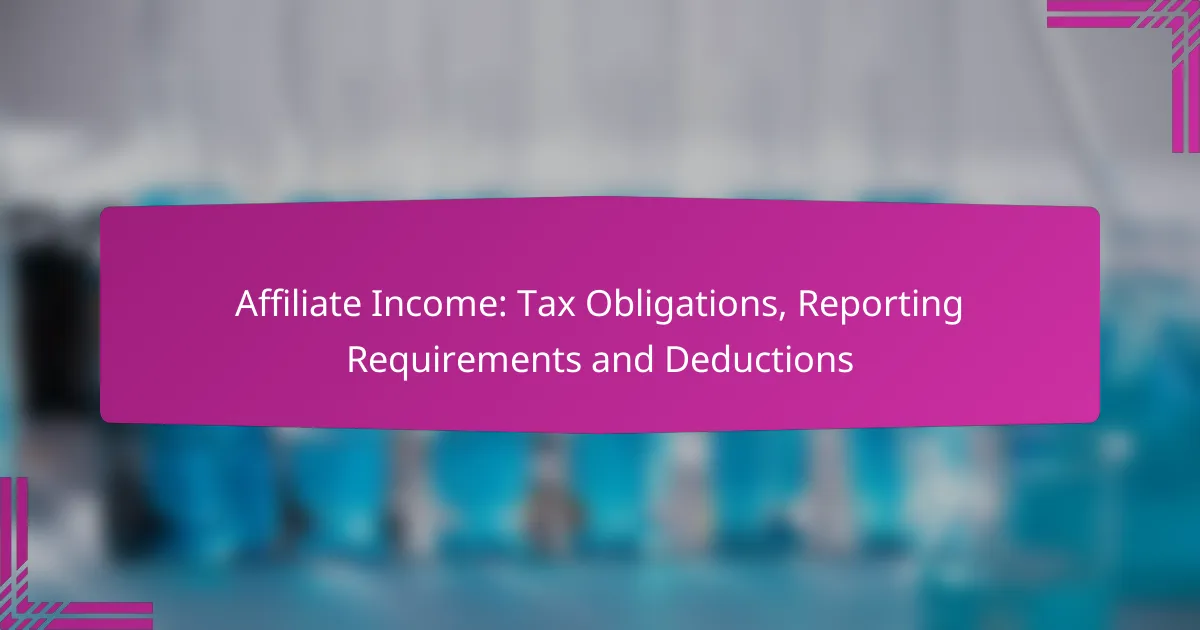Affiliate marketers in the US face specific tax obligations, including reporting their earnings as self-employment income and paying applicable federal and state taxes. Accurate documentation of income and expenses is crucial for compliance, typically involving tax forms like the 1040 and Schedule C. Additionally, understanding and claiming various deductions, such as home office expenses and business-related costs, can significantly reduce taxable income and enhance tax savings.

What are the tax obligations for affiliate marketers in the US?
Affiliate marketers in the US must report their earnings as self-employment income and pay taxes accordingly. This includes federal income tax, self-employment tax, and potentially state taxes, depending on where they reside.
Self-employment tax requirements
As an affiliate marketer, you are considered self-employed, which means you must pay self-employment tax on your net earnings. This tax covers Social Security and Medicare contributions, typically amounting to around 15.3% of your net income. If your net earnings exceed a certain threshold, you will need to file Schedule SE with your tax return.
To calculate your net earnings, subtract any allowable business expenses from your total income. Common deductions include website hosting fees, advertising costs, and any tools or software you use for your affiliate marketing efforts.
Income reporting thresholds
You must report all income earned from affiliate marketing, regardless of the amount. However, if you earn $600 or more from a single affiliate program, the company is required to issue you a Form 1099-NEC, which summarizes your earnings for the year. This form is also sent to the IRS, making it crucial to report this income accurately.
Even if you earn less than $600, you are still legally obligated to report that income on your tax return. Keeping detailed records of all income and expenses will help ensure compliance and simplify the reporting process.
State-specific tax considerations
Tax obligations can vary significantly by state, so it’s essential to understand the specific regulations where you live. Some states impose additional income taxes on self-employed individuals, while others may have unique rules regarding sales tax for digital products or services. Research your state’s tax laws to ensure compliance.
Additionally, some states have affiliate nexus laws, which may require you to collect sales tax if you have a significant presence in that state. This can impact your overall tax obligations and should be factored into your business planning.

How do affiliate marketers report their income?
Affiliate marketers report their income by documenting earnings and expenses accurately, typically using tax forms like the 1040 and Schedule C. It’s essential to understand the reporting requirements to ensure compliance and optimize tax obligations.
Form 1040 and Schedule C
Form 1040 is the standard individual income tax return used by U.S. taxpayers, while Schedule C is specifically for reporting income or loss from a business operated as a sole proprietorship. Affiliate marketers must complete Schedule C to detail their earnings from affiliate programs, which is then included in their Form 1040 submission.
When filling out Schedule C, include all income earned from affiliate marketing, along with any business expenses. Common deductions may include costs for website hosting, advertising, and other related expenses, which can help reduce taxable income.
Form 1099-MISC for earnings
Affiliate marketers often receive Form 1099-MISC from companies they promote if their earnings exceed a specified threshold, typically around $600 in a calendar year. This form reports the total income received, which must be included in the tax return.
It’s crucial to keep track of all 1099 forms received, as they provide a summary of earnings from different affiliate programs. If a marketer does not receive a 1099 but has earned income, they are still required to report that income on their tax return.
Quarterly estimated tax payments
Affiliate marketers may need to make quarterly estimated tax payments if they expect to owe a certain amount in taxes for the year, generally $1,000 or more. These payments help avoid penalties and interest for underpayment at the end of the tax year.
To calculate estimated payments, use IRS Form 1040-ES, which provides a worksheet to estimate tax liability based on expected income. Marketers should keep track of their earnings throughout the year to ensure accurate quarterly payments and avoid surprises during tax season.

What deductions can affiliate marketers claim?
Affiliate marketers can claim various deductions to reduce their taxable income, including home office expenses, business tools, and travel costs. Understanding these deductions helps maximize tax savings and ensures compliance with regulations.
Home office deduction
The home office deduction allows affiliate marketers to deduct a portion of their home expenses if they use part of their home exclusively for business. This can include rent or mortgage interest, utilities, and internet costs. To qualify, the workspace must be used regularly and exclusively for business activities.
To calculate the deduction, you can use the simplified method, which allows a deduction of a set amount per square foot of the home office, up to a maximum limit. Alternatively, you can calculate actual expenses based on the percentage of your home used for business.
Business expenses and tools
Affiliate marketers can deduct costs related to business tools and services necessary for their operations. This includes website hosting, software subscriptions, and any equipment purchased for business use, such as computers or cameras. Keeping detailed records of these expenses is essential for accurate reporting.
Common deductible business expenses may also include professional services, such as accounting or legal fees, and advertising costs. It’s advisable to categorize these expenses and maintain receipts to substantiate your claims during tax filing.
Travel and marketing costs
Travel expenses incurred for business purposes can be deducted, including transportation, lodging, and meals. If you attend conferences or meetings to promote your affiliate products, these costs can significantly reduce your taxable income. However, ensure that the travel is directly related to your business activities.
Marketing costs, such as paid advertising, promotional materials, and social media campaigns, are also deductible. Tracking these expenses carefully can help you evaluate the effectiveness of your marketing strategies while maximizing your tax benefits.

What are the common mistakes in tax reporting for affiliate marketers?
Affiliate marketers often make several common mistakes in tax reporting that can lead to penalties or missed deductions. Understanding these pitfalls is crucial for maintaining compliance and optimizing tax obligations.
Neglecting to track expenses
One of the most significant mistakes affiliate marketers make is failing to track their business expenses. Without accurate records, it becomes challenging to claim deductions, which can lead to a higher taxable income than necessary.
To avoid this, keep a detailed log of all expenses related to your affiliate marketing activities, including advertising costs, website hosting fees, and any tools or software subscriptions. Using accounting software can simplify this process and ensure you capture all eligible deductions.
Misclassifying income types
Affiliate marketers may misclassify their income, which can affect tax rates and reporting requirements. For example, income from affiliate sales is typically considered self-employment income, while referral bonuses may be classified differently.
Understanding the distinctions between various income types is essential. Consult with a tax professional to ensure you categorize your earnings correctly, as this can impact your overall tax liability and compliance with IRS regulations.
Missing deadlines for tax filings
Missing tax filing deadlines is a common issue for affiliate marketers, often resulting in penalties and interest charges. It’s crucial to be aware of the specific deadlines for self-employment tax returns and estimated tax payments.
To stay on track, set reminders for key dates and consider filing your taxes early. Utilizing tax software can also help streamline the process and ensure you meet all necessary deadlines, reducing the risk of costly mistakes.

What criteria should affiliate marketers consider for tax planning?
Affiliate marketers should consider income variability, business structure, and local tax regulations when planning for taxes. Understanding these factors can help optimize tax obligations and maximize deductions.
Income variability and forecasting
Income variability is a significant aspect of tax planning for affiliate marketers, as earnings can fluctuate widely based on market trends and promotional efforts. Forecasting income can help in estimating tax liabilities and setting aside appropriate funds for tax payments.
To manage this variability, consider tracking monthly earnings and identifying seasonal trends. This can assist in creating a more accurate budget for taxes, ensuring that you have enough set aside during lower income months.
Choosing the right business structure
Selecting the appropriate business structure is crucial for affiliate marketers, as it impacts tax obligations and liability. Common structures include sole proprietorships, LLCs, and corporations, each with distinct tax implications.
For instance, a sole proprietorship may offer simplicity but lacks liability protection, while an LLC provides a balance of limited liability and pass-through taxation. Evaluate the pros and cons of each structure based on your income level and risk tolerance to make an informed decision.

How do tax laws affect affiliate marketing in different states?
Tax laws significantly impact affiliate marketing, as each state in the U.S. has its own regulations regarding income tax, sales tax, and reporting requirements. Affiliates must understand these differences to ensure compliance and optimize their tax obligations.
State income tax variations
State income tax rates can vary widely, affecting how much affiliate marketers owe based on their earnings. Some states have no income tax, while others can impose rates that range from low single digits to over 10%. For example, states like Florida and Texas do not levy an income tax, while California has one of the highest rates.
Marketers should consider their state of residence when calculating their potential tax liabilities. It’s advisable to consult with a tax professional to understand how state-specific laws apply to affiliate income and to explore any available deductions or credits.
Sales tax implications for digital products
Sales tax on digital products varies by state, with some states taxing digital goods while others do not. For instance, states like New York and Washington impose sales tax on digital downloads, while states like California exempt them. This can affect how affiliates price their products and the overall profitability of their sales.
Affiliates should be aware of the sales tax laws in the states where their customers reside. It’s crucial to implement proper tax collection practices to avoid penalties. Using automated tools can help manage sales tax compliance efficiently, ensuring that affiliates meet their obligations without overwhelming administrative burdens.

What resources are available for affiliate tax education?
Affiliate marketers can access various resources to understand their tax obligations, reporting requirements, and potential deductions. These resources include official publications, online courses, and community forums that provide guidance tailored to affiliate income.
IRS resources and publications
The IRS offers a range of publications specifically designed to help individuals understand their tax responsibilities related to affiliate income. Key documents include Publication 334, which provides guidance for small business owners, and Publication 535, which covers business expenses that can be deducted.
Additionally, the IRS website has a dedicated section for self-employed individuals, which includes information on estimated tax payments and record-keeping requirements. Familiarizing yourself with these resources can help ensure compliance and optimize your tax situation.
Consider downloading the IRS forms relevant to your situation, such as Schedule C for reporting income and expenses. Keeping accurate records of your affiliate earnings and expenses will simplify the reporting process and help you avoid common pitfalls, such as underreporting income.



